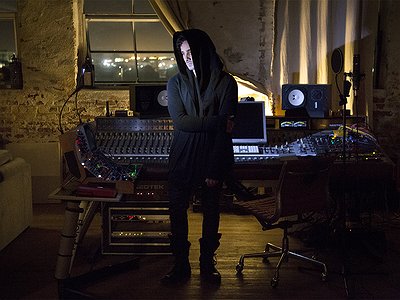Insultingly Bad
How strictly do you separate improvising and composing?
I separate them by not ever improvising because I'm so fucking terrible at it, I don't bother. I'm INSULTINGLY bad at improvising. It's just not something that ever interested me, particularly. Literally every other musician in the world does it better than I do. If I were a Transformer in a box at Toys R Us in 1987 and you held up that little red clear plastic thing to look at my stats it would say "Improvisation: 0".
How do you see the relationship between sound, space and composition?
To me they are one and the same. Sound and space are part of the composition; production is part of the composition; the notes, the chords, the words, the kick drum sound, the panning; all of it.
Do you feel it important that an audience is able to deduct the processes and ideas behind a work purely on the basis of the music? If so, how do you make them transparent?
Sometimes I think this is important. Most of the time, however, I hate this kind of thing. "Process" music usually pisses me off, even when I've done it myself, it has pissed me off. I have a 12" that's been sitting on hard drives since '07 that I haven't released because it's essentially a process unfolding (obviously) over ten minutes. I like the output, though. If the output weren't satisfying, the process is shit and pointless. Music like that absolutely fucking enrages me - process over output. Fucking turds, what's your point? Show us how smart you are? Care to write something meaningful? Oh, it's because you can't, and you're a hack, that's why you have to set up these absurd processes to compensate for your absolute dearth of talent and utter inability to create something resonant. There are examples of processes unfolding in music that are absolutely INCREDIBLE - guys like Reich, Basinski, Duane Pitre, Schoenberg, Bach. These instances are rare for me. Then there are so many composers out there who are engaging in setting up processes and with the results being secondary, I hear this music and go "zzzzzzzzzzzz". As far as making them transparent, well, I never cared about that for my own music. You'd have to ask someone like Steve Reich how to make it transparent - he used audible cues in Music for 18 Musicians, as one example - or he kept the process extremely primitive, as he did in "Music for Mallet Instruments, Voices, and Organ", which was a process of phrase lengths elongating at specific points throughout the piece. It was easy to hear this process, and because he has a wonderful sense of tonality, the result was lovely.
In how much, do you feel, are creative decisions shaped by cultural differences – and in how much, vice versa, is the perception of sound influenced by cultural differences?
Well, certain scales are culturally generated - we don't hear Ragas the same way someone from India would, and they respectively don't hear Katy Perry the way we do. So I do think that culture shapes perception of pitch, at least. Our Western ears are now trained to break music down into sonic sub-strata - kick drum, bass, accompaniment chords, melody, snare, hihat; chords resolve, melodies return. Other cultures around the world couldn't give one single fuck about this kind of sonic prison in which we find our stunted minds - a Balinese Gamelan doesn't play a specific tempo for long, or hang on a short melody - it's almost stream of consciousness the way some of that music is played; the rapture of the moment, and a stream of melodic content that keeps growing and growing and then shrinking and/or coming full stop. A piece can be played in five minutes, or they can jam on it for hours. That's just ONE example of a nearly infinite number of incredible musics being composed and performed around the world that most Westerners would hear and go "LOL WTF IS THIS SO BAD".
The relationship between music and other forms of art – painting, video art and cinema most importantly - has become increasingly important. How do you see this relationship yourself and in how far, do you feel, does music relate to other senses than hearing alone?
I can't cite a source, but I think there has been a study done that music is the art form most closely tied to memory. Something about auditory response triggering memory centers more than visual or taste, etc. I don't remember where I read this, but it made perfect sense. I watched The Breakfast Club again the other night for the first time since before John Hughes passed away, and when that Simple Minds song came on, every hair on my body stood on end and I got teary-eyed, thinking about my youth and how everything is so fucked now. It ties in with that film so much, the plight of the teenager, perennially misunderstood. Big John was the voice of Generation X, into which I fall squarely, so that music and that film, as an example of the synergy between different art forms, is to me, perfection.
As far as synaesthesia, I've experienced that. In fact I'd say it almost happens for everything I hear. Kick drums are deep purples and midnight colors - unless they are distorted, in which case they appear to me as brown. Snares are white, white, white. Yellow hihats everywhere, except the 808 hats, which are gold. This kind of shit happens all the time to me - I color my Logic or Ableton sessions according to what a sound synaesthetically looks like to me.
There seem to be two fundamental tendencies in music today: On the one hand, a move towards complete virtualisation, where tracks and albums are merely released as digital files. And, on the other, an even closer union between music, artwork, packaging and physical presentation. Where do you stand between these poles?
I need both, I love both. It's the same with how we create music - I need the digital, the manipulation, the perfection; but I also need the chaos and disorder and decay of analog. The immediacy of the mp3 is certainly convenient, and soundcloud, etc - it's great that every fucking moron can put up his absolutely parochial, uninspired crap - but on the other hand we hear mountains and reams and tons of really inspired music this way too, from people we'd never be able to find in the pre-Internet age. It's all a blessing and a curse. Listening technology continues to wane in quality, which I find troubling - millenials have the worst fucking ears of every generation since the industrial revolution, and honestly most of them probably deserve deafness as a payment for their singular lack of discernible taste. There is no denying the difference between sound as kinetic energy, or potential energy. Vinyl, tragically, is still such a minute sector of the - fuck, quit talk-pointing the god damned Jack White record, he's a 1%er and doesn't count - music industry, but it has experienced upward growth steadily each year for quite some time now, and the technology and sound quality of it continues to improve. All in all, though, the end result is a bad one for the industry and for music in general, because emphasis is on quantity over quality now.








